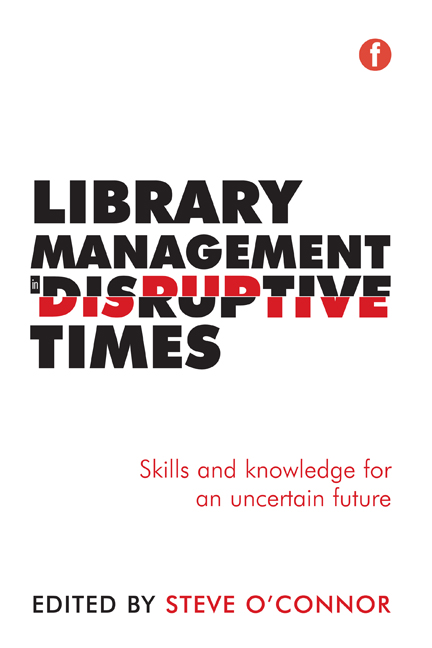Book contents
- Frontmatter
- Contents
- Contributors
- Introduction
- 1 Leading change: knowledge for success
- 2 Management fads and fashions and their impact on the LIS community
- 3 The Five Rules of Engagement for librarians: aux Ranganathan's laws of library science
- 4 Library management, disruption and consortia: an Australian example
- 5 No regrets; just lessons: economic crisis is changing our life and the management of libraries
- 6 Introducing agile principles and management to a library organization
- 7 The role of professional associations in changing times
- 8 And the walls came tumbling down ... The library profession confronts all-invasive new managerialism
- 9 What is behind the meaning of disruption? Or, thinking of management strategies from the outside
- Index
Introduction
Published online by Cambridge University Press: 08 June 2018
- Frontmatter
- Contents
- Contributors
- Introduction
- 1 Leading change: knowledge for success
- 2 Management fads and fashions and their impact on the LIS community
- 3 The Five Rules of Engagement for librarians: aux Ranganathan's laws of library science
- 4 Library management, disruption and consortia: an Australian example
- 5 No regrets; just lessons: economic crisis is changing our life and the management of libraries
- 6 Introducing agile principles and management to a library organization
- 7 The role of professional associations in changing times
- 8 And the walls came tumbling down ... The library profession confronts all-invasive new managerialism
- 9 What is behind the meaning of disruption? Or, thinking of management strategies from the outside
- Index
Summary
As an accidental editor
As the editor of this volume, I sought chapters from a wide range of knowledgeable, influential and thoughtful contributors around the globe. They were each asked to write about the impact of ‘disruptive change’ on libraries, library management and library managers as they saw it. Each author has a particular area of expertise and perspective on that impact. I believe that the resulting volume offers perspectives on many aspects of library sectors, professional associations, geographic regions and education.
From my perspective as a journal editor, it is often absorbing to read and judge the many unsolicited articles received from fellow professionals. The journal articles are reflective of the issues that are on the minds of those who are leading the profession. Admittedly, the writers are not always in leadership roles, but they are influencing the thinking and management behaviours in the profession at all levels. Those that are published become part of the corpus of what is happening in the profession at that particular time.
The chapters of this volume, however, have been specifically commissioned. Many of the authors have published at one time or another in Library Management and elsewhere. But here they are writing to the brief ‘What is the impact of disruption in libraries on your area of expertise?’
Ian Smith is an international authority on change management. His writings are sought after and his advice and insights are well received. His Chapter 1, on the five themes of change, is an excellent chapter with which to begin the discussion on disruption. Ian's experience is clearly articulated and highly readable.
Bill Fisher is a professor in the School of Library and Information Science at the San Jose State University. In Chapter 2 he discusses management fads and fashions and their impact on libraries. Bill is a highly experienced and insightful library academic working in the area of leadership and management. His starting point is that the current ‘off the shelf’ management theorem seems to provide the easy way forward. He argues that management is pure, hard work, especially in an environment where the only constant is change. He guides us to the areas we need to focus on in order to achieve good results while remaining wary that the fads and fashions may not deliver the easy, long-terms solutions that we hope for
- Type
- Chapter
- Information
- Library Management in Disruptive TimesSkills and knowledge for an uncertain future, pp. xiii - xviPublisher: FacetPrint publication year: 2015

